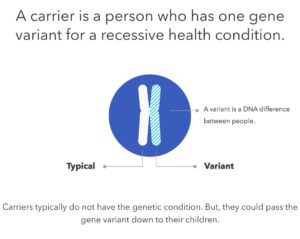By Erynn Gordon, MS, LCGC
23andMe’s Director of Clinical Development
Testing in pregnancy can be a little overwhelming for prospective parents – blood tests, glucose challenge, ultrasounds, and fetal nonstress tests. Many of these tests are offered with little explanation but rather the expectation that you’ll proceed for your baby’s health.
But as a genetic counselor and a mother, I know that all these tests can be overwhelming. One particular type of testing that warrants more attention before pregnancy is carrier status testing for genetically inherited conditions.
I’m a big proponent of genetic testing, and I think the best time to be tested is before a pregnancy. Genetic testing pre-pregnancy allows a couple to learn about their carrier status; if they are carriers, they have the luxury of learning about the disease risk and discussing it with their healthcare provider.

What Are Carrier Screening Tests?
Carrier status tests are genetic tests used to determine if you carry a genetic change – or variant. For the conditions included in a carrier status test, having one genetic change – being a carrier – typically doesn’t mean you will have that condition. Still, you could pass on the variant to your child.
For autosomal recessive disorders, the types of conditions that healthcare providers are looking for when they do a carrier status test, it is only when both parents are carriers for the same condition that the child has a 1 in 4, or 25 percent, chance to be affected with the condition. (It’s important to note that this also means they have a 75 percent chance that their child will not be affected.) Autosomal recessive conditions for which carrier testing is commonly offered by healthcare providers include cystic fibrosis, Tay Sachs disease, and sickle cell anemia, among many others.
What Can You Do if Both You and Your Partner Are Carriers?
If you and your partner are carriers, you should speak to your doctor or healthcare professional to understand your options fully.
Women interested in carrier testing can talk to their gynecologist or obstetrician to learn about available options. Usually, carrier testing is offered based on a woman’s ethnic background.
For example, women of African descent may be offered carrier status testing for sickle cell anemia.
Women of European descent may be offered testing for cystic fibrosis. Standard carrier status testing recommendations are based on the most common disorders in each population. Historically, these targeted tests made sense because of the high cost of genetic testing. But now, because of the dropping cost of genetic testing, it is feasible to test for genetic conditions more broadly. This broader approach means that even women who do not have much information on their ancestry but want to have carrier status testing done are no longer limited based on knowledge of their family background.
Broad-based carrier testing, sometimes called pan-ethnic carrier testing, is available through traditional healthcare providers and direct-to-consumer.
Direct-to-consumer genetic tests, such as the carrier status test offered by 23andMe* can provide valuable insights that can help start the conversation with your healthcare provider about appropriate genetic screening. At this time, no genetic test covers every possible risk to your future children so whether you choose direct-to-consumer testing or you have testing through your healthcare provider, be sure to ask about the limitations of the test so that you understand what the test can tell you and what it can’t.
Have more questions? Consider talking with a genetic counselor. You can find a local genetic counselor through the National Society of Genetic Counselors.




